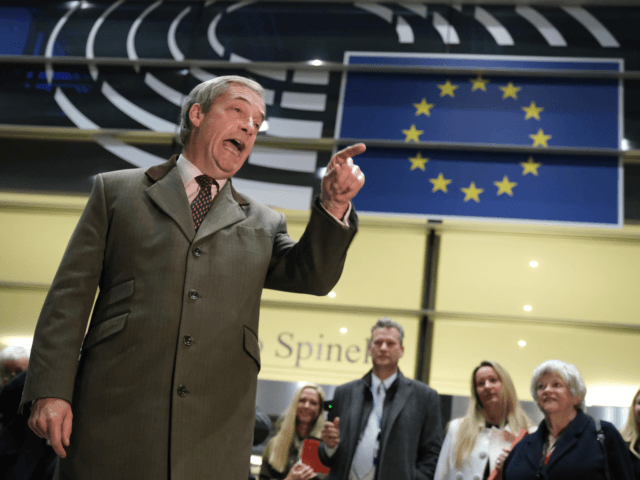Brexit leader Nigel Farage has accused the European Union of rank hypocrisy for “funding Putin’s war machine”, as the bloc admitted to spending €35 billion on Russian gas since the invasion of Ukraine.
Once again taking up the mantle of criticising the globalist bloc, Nigel ‘Mr Brexit’ Farage said that German and other EU member states are propping up the Russian economy with one hand while sanctioning the country not the other.
“Not only is the Russian ruble back to where it was before the invasion, but the Germans keep buying huge volumes of gas and oil. Germany and other EU states are funding Putin’s war machine,” Mr Farage wrote on social media.
The statement came after the European Union’s Foreign Affairs and Security Policy representative, Josep Borrell told the European Parliament that since Putin launched the invasion of Ukraine on Feb 24th, some €35 billion (£29/$38 billion) has been sent to Russia from EU member states in exchange for natural gas.
At the same time, the EU has sent some one billion euros (£0.83/$1.09 billion) worth of weapons and other armaments to Ukraine, the foreign policy chief admitted.
“It might seem a lot, but €1 billion is what we pay [Vladimir] Putin every day for the energy he provides us,” the Spanish politician said per Britain’s Daily Telegraph.
“Since the beginning of the war, we have given him €35 billion, compared to the €1 billion we have given Ukraine in arms and weapons.”
The Eurocrat used the striking figures to bolster his call for more sanctions on Russia and for the bloc to send more weapons to Ukraine.
“We have to keep arming Ukraine. We need less rounds of applause and more assistance. We want to say less that Mr Zelensky is a hero and give more weapons. That is what the Ukrainians expect and that’s what we’re doing,” Borrell said.
Half-measures: EU reportedly exempting key Russian banks from SWIFT ban to keep buying gas, meanwhile Gazprom… https://t.co/APDc3yaJak
— Breitbart London (@BreitbartLondon) March 3, 2022
In contrast to the push for more weapons and more sanctions, there has been little appetite for negotiating for peace, with the exception of French President Emmanuel Macron, who has been conducting repeated bilateral conversations with Vladimir Putin.
Despite German Chancellor Olaf Scholz joining some of the calls with Macron, the role of mediator has largely fallen to France, which has a relatively robust domestic nuclear power industry, with Germany effectively sidelined due to its over-reliance on Russian gas, after decades of attempting to transition to a so-called green economy.
While Europe has been keen to sanction Russia and send or sell weapons to Ukraine, there has not been much political pressure placed on globalist financial institutions such as the European Investment Bank, International Monetary Fund (IMF), and the World Bank to cancel Ukrainian debt — which following the invasion is likely to struggle even servicing the $129 billion in external debt.
The EU has also so far refused to ban Russian gas outright, with economically critical countries such as Germany and Italy being heavily dependent on gas from Russian pipelines to keep their economies churning. Indeed, even the sanctions banning Russia from the international SWIFT payment system allowed for carveouts for European countries to continue purchasing gas from Putin’s regime.
The bloc has proposed a ban on Russian coal, however, this has yet to be approved, with all 27 member states needing to sign off on such a move. European countries purchase around €4bn ($4.4bn; £3.3bn) worth of coal from Russia every year.
European Union, UK, and US Prepare More Russian Sanctions in Response to Bucha Killingshttps://t.co/0P2fWnrlwF
— Breitbart London (@BreitbartLondon) April 6, 2022
Follow Kurt Zindulka on Twitter here @KurtZindulka

COMMENTS
Please let us know if you're having issues with commenting.